Monday Feb 16, 2026
Monday Feb 16, 2026
Saturday, 23 November 2024 00:03 - - {{hitsCtrl.values.hits}}
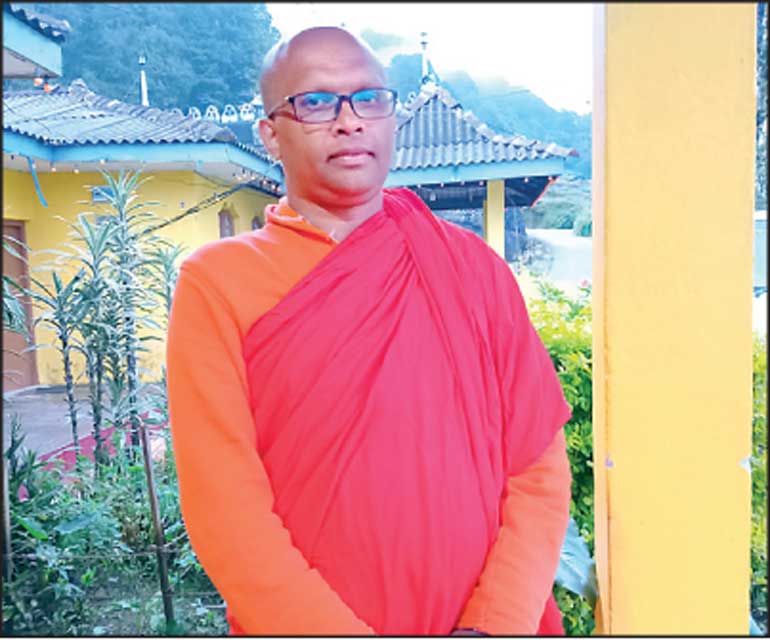
Ven. Dhammadassi Thero 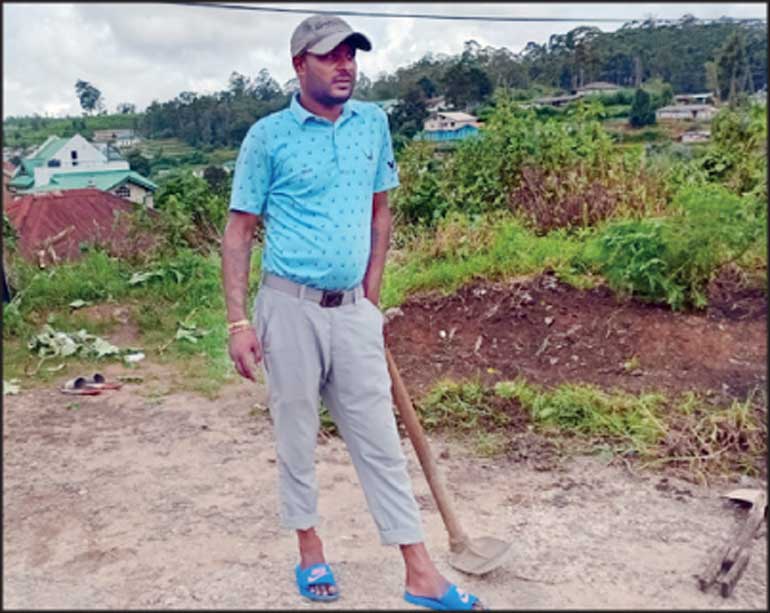
Auto driver Sashidaran Rasalingham clearing public areas of garbage 
Rasalingham in his vehicle
By Surya Vishwa
Mountains that reach to the skies complemented by cascading tresses of waterfalls and trees, and at its feet, hemmed like frills in a dress made for a fancy ball parade, the tiers of vegetable cultivation where one witnesses the producing of a diverse range of vegetation. Police personnel on horses doing their rounds across the city, more as an exercise for the animals than a security inspection, following a tradition that was enforced during British colonial rule where the identity of ‘Little England’ was established in Nuwara Eliya.
Abandoned looking ponies and cows wandering aimless along the roads and often getting drenched in the rain and frisking about in the sun. The mist that wraps the mountain tops and the almost perpetual iconic Nuwara Eliya drizzle that seams up the skies with the earth, punctuated by the sharp bursts of sunshine that light up this marvellous district which boasts of the highest altitude in Shanthipura and the incredible view point in adjoining Kalapura which are comparatively lesser populated than the vicinities close to the Nuwara Eliya town.
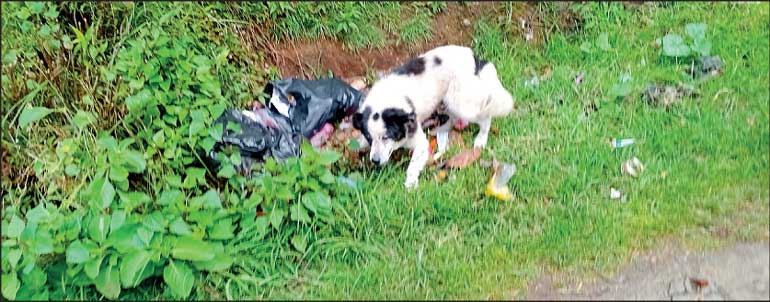
Dogs eating human trash
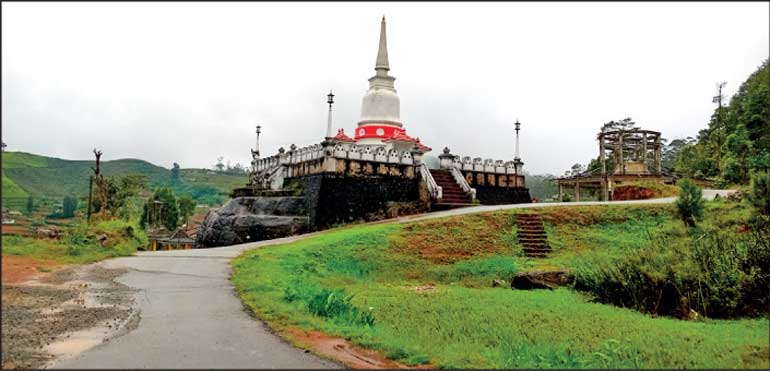 Jethiya Giri Maha Viharaya of Shanthipura
Jethiya Giri Maha Viharaya of Shanthipura
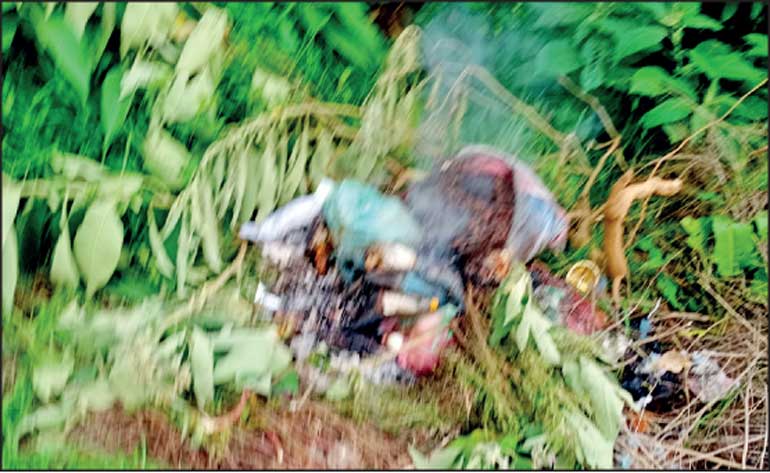
Burning of roadside plastic included garbage 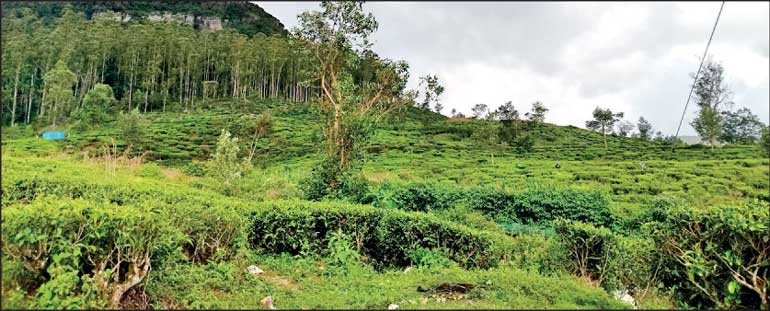
Scenic Nuwara Eliya
Nuwara Eliya is a vegetable and fruit cultivation base more than tea but there are locations where tea is grown such as near the Lovers Leap waterfall area and the above mentioned Kalapura and Shanthipura locations. Nuwara Eliya is a haven where city tired folk, Sri Lankan or otherwise, can feast their eyes upon and rejuvenate their spirits. Hikers around the world are attracted by hiking spots such as the Lovers’ Leap waterfall as they climb to the top which is non arduous for a seasoned mountaineer.
The two chief income generating avenues for the residents of Nuwara Eliya are cultivation and tourism. Many families have home stays which are popular because of their cheaper rates and these attract both the local and foreign tourists alike.
The bane of Nuwara Eliya
Nuwara Eliya has the potential to be one of the best competing idyllic tourist spots in the world. Now let us travel down the long road towards that potential and accost one of the most unpleasant sights that is the bane of Nuwara Eliya, beginning with the trash strewn, pothole ridden bus stand which is a terrible sight during rains. For someone who comes in expectation of mother earth’s pristine beauty and finds instead at every yard abandoned, anonymous bags of garbage with mounds of burning plastic and food refuse strewn across the road, it will be clear that we Sri Lankans have to begin from scratch to develop a far thinking garbage clearance policy aimed at changing a national mindset that makes it a ‘normal’ everyday practice to just dispose of household refuse at whim anywhere, often in front of other people’s houses.
We publish here self-explanatory photographs that will speak better than words of the urgency that is required for an authentically working central, district and provincial governance system that address this issue in a multi-pronged way.
Any social issue is best explained by the voice of the people as they are told and we below cite them verbatim. We begin with the words of a woman around 70 years of age who was seen happily kicking at plastic strewn across a mountainous range that is bordered by crowded unplanned housing with weak sanitation. In many locations across Nuwara Eliya such as this it is a common sight for the residents who had populated the area on permit land (without legal deeds) to throw their garbage into the base of bordering waterfalls, mountain ridges or roadways.
Are you not living in Sri Lanka?
This is how the conversation and the interesting outburst of the woman went.
Q: Do you have no problem passing these plastic bags, bottles and beer cans every day?
A: No. Why should I have a problem?
Q: You have just kicked at and passed plastic covers and such. Do you not see a problem in seeing these non biodegradable elements thrown on the route to your house?
A: No. What should be the problem?
Q: So you see no problem with it?
A: No. What nonsense you are talking about. Are you not living in Sri Lanka? The whole of Sri Lanka is like this.
Q: So you think it is alright for you to ignore all the trash in Nuwara Eliya because the whole of Sri Lanka is like this?
A: Of course. This is how it is here.
At this point I intervene that it is ignorance as opposed to wise action and use the terms ‘Nugath’ (ignorance) and ‘Gnana’ (wisdom) to juxtapose the mentality of a people destroying the mother earth bounty of a country that is probably one of the most diversely beautiful in the world.
In a quite hilarious but potentially dangerous interlude that follows this woman is heard telling another woman, who also it is learnt daily burns her household refuse including batteries and plastic, as follows: “Kawda meki. Mekiwa Gahala Elawanna One.” (Who is this woman, she should be assaulted and thrown out).
This of course led to this writer telephoning a senior police personnel on the interview list for this media research related to the garbage menace of Nuwara Eliya. He was thereby informed of the above mentioned verbal threat in case I need to make a formal police complaint if activated by this uncouth grandmother who had apparently misheard and confused the Sinhala word ‘Gnana’ – Wisdom with ‘Jana,” cells and thus understood as ‘Ignorant cells,” which I believe was taken as an insult to her family DNA heritage!
Not quite knowing whether to laugh or to cry I then proceed to my next interview which is with Shashidaran Rasalingam whose livelihood is gained by driving a trishaw also referred to as three-wheeler. He is stationed along with about five other drivers in front of the Grama Sevaka office near the Gayathri Kovil eatery called Gayathri Mess. From last Saturday to last Monday the gate of the Grama Sevaka office was completely obstructed by garbage.
A common sight
Sights such as this are common to Shashidaran who is an exasperated young man. He is often found with mammootty in hand cleaning up garbage dumped daily in front of this three-wheeler park which can be also described as being dumped in front of the Grama Sevaka office. He gets abused in choice language when he objects to people dumping bags of trash on the adjoining roadside which are promptly torn out by dogs and where with the food, the plastic is also consumed. Then this meal of human despicability is shared by cows, ponies and horses alike.
“Miss, there were times when I have received death threats when I protested against the throwing of rubbish here. Myself and the other boys here have given up. We just sit in our three-wheelers and shut our eyes and pray to the gods that our people will change. There are locations in the Lovers Leap area where one cannot step foot into. I will take you there next week and you can see for yourself.”
By this time my eyes are sore. The sight of roadside garbage and the confetti of multifarious plastic that dots place only contributes to the rising blood pressure of an environmentally sensitive visitor who comes to the incredibly beautiful hilly areas of Sri Lanka to relax and then is confronted by the daily public rampage of indiscipline.
“This is a problem that I have tried to address several times by mobilising the youth of the Daham Pasal (Sunday schools) run by this temple,” states Ven. Kotmale Dhammadhassi Thero, the current Chief Buddhist Monk of the Jethiyagiri Maha Viharaya of Shanthipura.
Below is what this Venerable Thero has to say.
“Shanthipura is a village that was established between 1960 and 1970 by William Fernando, a former store keeper of a tea estate who entered politics and rose to the level of Governor. In 1960 there were only six families and now there are hundreds. There are 31 guest houses in this village. I doubt how many of these would have a responsible way of segmenting between biodegradable and non-biodegradable and then disposing of trash in a manner where it can be recycled. When the license of operation is given to these guest houses it should be determined very clearly that they take necessary action to dispose of garbage in a responsible manner with the necessary awareness and monitoring. The burning of plastic which happens daily should be stopped.”
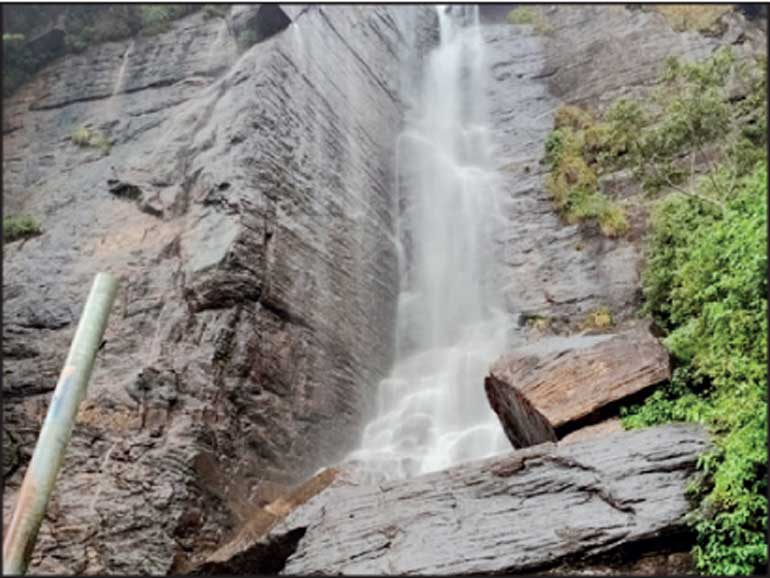
Lovers Leap waterfall in Nuwara Eliya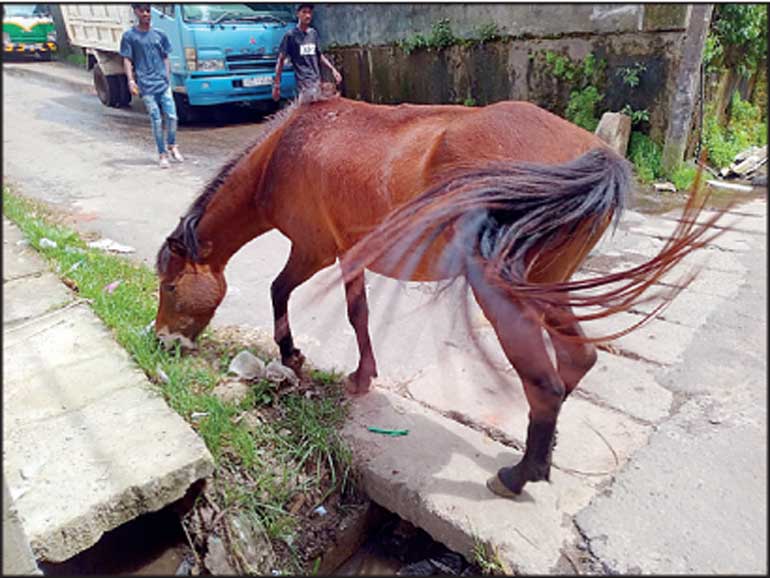
Proof of untamed mind of man
Vileness of humans
I travel to this Buddhist temple with Karen Knipp-Rentrap, a German national working in the development sector in Austria whose career has involved much experience in African countries where there are international projects and awareness on recycling, merged with aspects such as empowerment of women and community integration.”
Karen, a friend of a friend and an ardent hiker enthralled with the beauty of this country carried a chocolate wrapper across several Lankan districts and not finding a dustbin texted me en route to Nuwara Eliya as to where she can find one and finally was triumphant that she found a small public bin. Keen to learn about Buddhism she wanted to meet a Buddhist monk and was very happy to travel with me and meet Ven. Dhammadassi who availed himself freely of his time and what resulted was a vibrant sharing of ideas, concepts and solutions to a problem that the world faces equally; how man can live in harmony with this generous planet earth without poisoning and polluting it.
Buddhism as a global lesson in sustainability promotion
As Karen shared her experiences in countries such as Uganda and Rwanda where small community groups take strong leadership to combine entrepreneurship promotion with sustainability factors, she also added in how Austria and Germany are moving into cardboard, hardboard and paper packaging for food items and supporting research that will promote reducing environment pollution. And she pointed to a moving photograph – that of a tortoise with a straw up its nose that is used in Europe through billboards to sensitise people on the impact each plastic item we discard unthinkingly has upon this planet. The discussion then goes on for over three hours on how each action of an individual has a snowballing effect in ‘normalising’ such an action and how a world religion such as Buddhism could be directly used as a global lesson in sustainability promotion.
Discussing how it is ‘normal’ now, for nationals in countries across Europe to carry their cloth bags to the market (Karen brought hers to Sri Lanka) we look at the many integrated ways that the reverse of throwing out household refuse indiscriminately on the road can impact change making.
Ven. Dhammadhassi goes on to point out that officials such as Public Health Inspectors (PHI) and Grama Sevakas should take their duties beyond their desks.
“A PHI has to be continually on the field. It is by being daily on the field that he has to ensure that public health is protected. Garbage on the road is not only an unpleasant sight but it also directly or indirectly impacts public health. We have to develop integrated awareness among children, youth, career persons of diverse strata, and old persons that what we have been accustomed to our entire lifetime in this country is not according to our Buddhist wisdom. The Lord Buddha’s journey to seeking the truth was inveigled with the natural world. When he left the palace as a prince it was the forest that housed him, nurtured him and was his first university in seeking wisdom. It is in this backdrop that we study the Buddha’s advice to fellow monks on how to use the robe sustainably – first to cover the body, then as a cover to aid sleeping comfortably, then when it is worn further and torn, as a foot-mat or for cleaning and finally to be churned in with clay for sustainable housing construction. Buddhism equals nature and in a world where nature is threatened we must revive these teachings,” he notes.
Merging the ancient with the modern to save our planet
The conversation shifts to ancient wisdom such as those of the Celts and the Driuds, who lived in isolated mountainous and nature based locations across Europe, before the Roman armies vanquished them and had their beliefs labelled as sorcery. We discuss how these ancient earth integrated traditions could be compared and contrasted with philosophies such as Buddhism and then used to understand the need to merge the ancient with the modern and save our planet from our age of development.
Ven. Dhammadhassi, an activist in mobilising youth in his area to prevent public littering, details out how the divisional and district secretariats and the municipal councils should adopt grass root based approaches. Approaches that will develop small steps towards policy hallmarks aimed at comprehensively resurrecting Sri Lanka from mindless garbage disposal. And thereby discipline the nation to sort their garbage diligently and thereafter encourage to innovate on entrepreneurship and invention models linked around this.
We discuss how garbage clearing has to be systemised very strictly with different days for plastic, paper, food items and batteries and for special attention on hospital waste.
The topic moves to why we have government ministries and ministers. We discard the squandered 76 years and instead look to the future.
The Ven. Thero then cites an experience at the general hospital in Nuwara Eliya where the reception and the mortuary are side by side and where the smell emanating from decaying bodies assail the nostrils of those still alive. He draws attention to how Sri Lanka has no mechanism to deal with hospital waste and how overall all substances including injections are disposed of in the normal way.
“Who would take responsibility if an injection used on a patient with a communicable disease accidentally pricks a worker who cleans this garbage?” he queries.
“These are the things that we have accepted as normal. At least now these should change and we must collectively not be apathetic anymore,” he states emphatically.
Garbage fights everywhere
In a different location in Nuwara Eliya I am accosted by a woman who runs after me and breathlessly tells me to come to her house. Someone has seen me interviewing some municipal workers and she wants to tell me how nameless people dump garbage in boxes and bags in front of her gate.
“There are pampers and used sanitary wear. When we open the gate these are there. There are fights with neighbours when I go to ask who could have done this. The municipal lorries come once a week to our areas. This is not enough. They do not come up mountains. We need easily accessible public dustbins so that we can learn to separate what we discard from our households and put them away easily. There are many garbage fights everywhere where those across the road accuse each other and where neighbours accuse each other.”
Our next week’s edition will focus on a list of recommendations and interviews with those such as entrepreneurs and inventors of Sri Lanka who have tried to solve the problem of unsustainable living with their talent but who have hitherto been ignored by respective regimes.